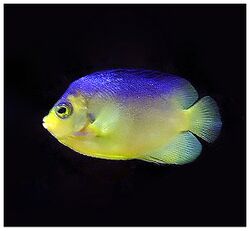Biology:Cocos-Keeling angelfish
| Cocos-Keeling angelfish | |
|---|---|

| |
| Scientific classification | |
| Domain: | Eukaryota |
| Kingdom: | Animalia |
| Phylum: | Chordata |
| Class: | Actinopterygii |
| Order: | Perciformes |
| Family: | Pomacanthidae |
| Genus: | Centropyge |
| Species: | C. colini
|
| Binomial name | |
| Centropyge colini Smith-Vaniz & Randall 1974
| |
The Cocos-Keeling angelfish (Centropyge colini), or Colin's angelfish is a small species of ray-finned fish, a marine angelfish belonging to the family Pomacanthidae. It is found in the Indo-West Pacific region.
Description
The Cocos-Keeling angelfish is mainly lemon-yellow in colour with a wide blue stripe from the nape along the back to the middle of the dorsal fin. There is a thin purplish ring around the eye.[2] The dorsal fin contains 14 spines and 16-17 soft rays while the anal fin has 3 spines and 17 soft rays. This species attains a maximum total length of 9 centimetres (3.5 in).[3]
Distribution
The Cocos-Keeling angelfish has been recorded from a scattering of sites in the Indo-West Pacific. These include the Spratly Islands, Palau, Papua New Guinea, Indonesia, Marshall Islands, Cocos Keeling Islands, Fiji and Guam, with an unconfirmed report from the Ogasawara Islands off Japan.[1]
Habitat and biology
The Cocos-Keeling angelfish is found at depths between 20 and 100 metres (66 and 328 ft).[1] It is a shy and secretive species which lives in crevices and caves in deep reef drop offs. It is found in groups which consist of a male and a harem of 2-6 females.[3] The male is replaced by the most dominant female if he disappears. Very little is known about the diet of this species.[2]
Systematics
The Cocos-Keeling angelfish was first formally described in 1974 by William F. Smith-Vaniz and Ernest J. Randall (1924-2020) with the type locality given as Turks Reef in the Cocos-Keeling Islands.[4] Some authorities place this species in the subgenus Centropyge.
Etymology
The specific name honours the biologist Patrick L. Colin who helped collect the type.[5]
Utlisation
The Cocos-Keeling angelfish rarely appears in the aquarium trade.[3]
References
- ↑ 1.0 1.1 1.2 Pyle, R.; Myers, R.F. (2010). "Centropyge colini". IUCN Red List of Threatened Species 2010: e.T165838A6145523. doi:10.2305/IUCN.UK.2010-4.RLTS.T165838A6145523.en. https://www.iucnredlist.org/species/165838/6145523. Retrieved 20 November 2021.
- ↑ 2.0 2.1 Dianne J. Bray. "Centropyge colini". Fishes of Australia. Museums Victoria. https://fishesofaustralia.net.au/home/species/4836. Retrieved 20 January 2021.
- ↑ 3.0 3.1 3.2 Froese, Rainer and Pauly, Daniel, eds. (2019). "Centropyge colini" in FishBase. December 2019 version.
- ↑ Eschmeyer, William N.; Fricke, Ron; van der Laan, Richard, eds. "Species in the genus Centropyge". California Academy of Sciences. http://researcharchive.calacademy.org/research/ichthyology/catalog/fishcatget.asp?tbl=species&genus=Centropyge.
- ↑ "Order ACANTHURIFORMES (part 1): Families LOBOTIDAE, POMACANTHIDAE, DREPANEIDAE and CHAETODONTIDAE". The ETYFish Project Fish Name Etymology Database. Christopher Scharpf and Kenneth J. Lazara. 21 July 2020. http://www.etyfish.org/acanthuriformes1/. Retrieved 17 January 2021.
Wikidata ☰ Q1061185 entry
 |


